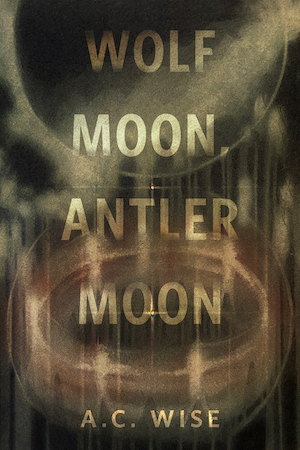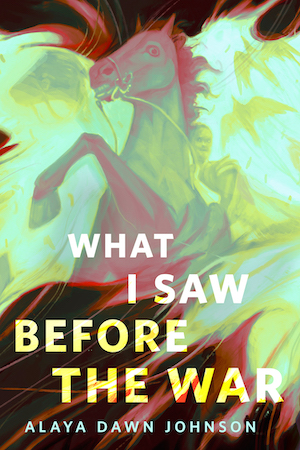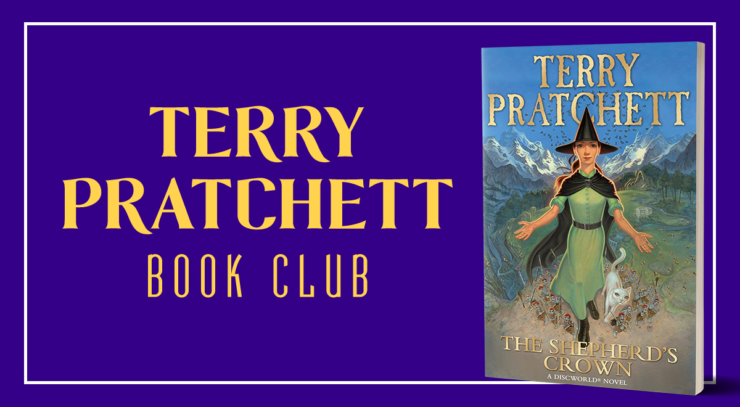It’s been nearly ten years since the final Terry Pratchett book made its way into the world…
Summary
Tiffany brings Nightshade to her parents’ barn and begins teaching her how to behave around people. At first Nightshade thinks of trying to use her old glamour and tricks, but she quickly realizes that won’t work and wants to know why Tiffany would help her. Tiffany tries to explain the ways in which humans are different from elves. Magrat can sense the elves returning, so she hands the kids over to Verence and gets on her old broomstick to go see Tiffany, letting her know that they’re going to need a lot more witch help to stave off what’s coming. She suggests that she could go speak to Letitia to encourage her to commit a bit more to the witching side of being a baroness, which Tiffany appreciates. Elves steal baby Tiffany, and so Tiffany comes to the girl’s rescue, killing the elves, and then worrying over the fact that she committed murder to save the infant. She then brings the baby home and again tries to impress upon the parents that they must take care of their daughter. Distraught, Tiffany goes to Nanny and talks with her about what she just did. Nanny suggests that she go to the Long Man to talk to the King of the elves. The Feegle join her, and Tiffany tells them to guard the entrance to the cave so no one can follow her in.
Tiffany talks to the King of the elves, who doesn’t seem to care about his people invading the human world. He tells Tiffany to kill them if she’s so inclined, as he’s bored and in search of new entertainment. Tiffany asks Rob to build him a shed like Geoffrey’s suggestion to the Lancre men, for entertainment. She keeps teaching Nightshade about humanity, encouraging her to practice empathy and help others, taking her on the witching rounds. Geoffrey visits Mr. Sideways, and learns that he’s building some sort of machine in his own shed. Magrat has a talk with Letitia and points out that no matter what Letitia thinks of her own abilities, she is a witch and she needs to be willing to help out Tiffany and the rest with the elf problem. She asks Letitia if she needs a lift to the witch’s meeting to discuss the problem. Tiffany goes to see old Mrs. Pigeon and in taking some of her pain away causes a ruckus at the house. She asks Nightshade to stay with her a moment, and then asks her to take a glamour off the family’s stream. Nightshade agrees to do this because she is Tiffany’s friend. Geoffrey finds out that Mr. Sideways is making weaponry in his shed, and advanced weaponry at that.
The war council of witches commences at Lancre castle, and Tiffany has Geoffrey do his calm-weaving so that fights don’t break out among the group. She tells them that the elves are coming and that most of them have never fought elves, so they don’t know what to expect. Tiffany asks Nightshade to put a glamour on the group so that they know what it feels like—it makes them feel worthless and small, all except for Mrs. Earwig, who is totally unaffected. Nightshade claims it was like trying to glamour a wall and wonders if she isn’t an elf somehow. She tells the group that the elves will attack during the full moon (that night), a time of endings, and do it where the barriers are weakest. This means that they need to defend both the Dancers in Lancre, and the Chalk as well, so the group is split. Tiffany heads home to get some rest and finds herself talking to the the shepherd’s crown, who tells her that she is a first among shepherds. She feels the specters of Granny Aching’s dogs, Thunder and Lightning. Everyone wakes in the night as the attacks begin. The Lancre group stops Lord Lankin with the swarf weapon from the old men and witches every which way.
The fight on the Chalk is fierce, with Miss Tick and the Feegle and Letitia all working in concert, but they’re still losing. Tiffany goes to face Peaseblossom, but Nightshade stands between them to fight for her friend. Peaseblossom is disgusted by the concept and slays her. Tiffany is furious, but a glamour almost pulls her under until she remembers her connection to the land and acts as a conduit for it. She cleanses the Chalk of the elf world and calls the King of the elves to her. He wonders about how the world has changed and respects Tiffany now, cutting down Peaseblossom without a thought. She commands the king to leave, as he wonders if trains couldn’t be built without iron. The witches gather after the battle, and Tiffany decides that Geoffrey will take up Granny Weatherwax’s steading, as she belongs on her own land. None of the witches protest. Geoffrey is also made an ambassador to Lancre so that he can go home and show up his father, letting the man know that he’s been selected to do the first trial run for a fox-proof chicken coup, so there will be no need for the hunt anymore.
Tiffany goes to the local carpenter and asked him to teach her his trade because she means to rebuild Granny Aching’s hut. She manages it, and sees Granny Aching and Granny Weatherwax together with Thunder and Lightning, and knows that Granny Weatherwax is everywhere. Her father comes to visit her up the hill and is pleased with the steading. The carpenter visits and is impressed by her work.
Commentary
And so, the final words of the Discworld are:
Mr. Block looked at her suspiciously for a moment. “So did you use magic to make the hut, miss?”
“I didn’t have to,” said Tiffany. “The magic was already here.”
Gonna sit with that one for a minute. And cry for a while.
In many ways the series began with that thought, didn’t it? About how you couldn’t use magic to solve your problems because it was more trouble than it was worth. That thought slowly morphed over to time to remind us that you couldn’t simply make things happen with magic—but it was still all around us. In simple things that we often take for granted. And he made sure to end three decades of work on that thought.
For no reason at all, I’m sure.
I have a very different perspective on the book this time around, I’ve realized. In some ways, I’m almost glad that it isn’t entirely finished the way Pratchett would have liked? Because it gives us a small window into his process, in a way, a suggestion of how he drafted and where he went back over spots to punch them up. I found myself marking out places where I assumed he wanted to add more, or change a turn of phrase, and it’s so incredibly useful, while being something we rarely see from authors we love. Perhaps not the best for the ego, but so good for educational purposes.
There are a few consistent messages within your average Pratchett story that make their way poignantly into this book because they’re not in focus at all, but they still need to be there. The one that comes to mind the most for me is little Maggie, one of the girl Feegles, insisting that she doesn’t want to be a kelda, she wants to fight beside her brothers. Without making that into a key plot point, Maggie simply shows up in the battle agains the elves and it’s noted with triumph.
As these stories have constantly shown us, you can’t stop progress. Some will try, and then the world will give way and change, and they’ll be left behind. So Geoffrey is a witch and Maggie will be a warrior and the Chalk isn’t going to burn witches ever again and elves are going to leave the world and head somewhere a little less dangerous because there’s no room for them. The world will change and will, largely and hopefully, be the better for it.
And then you’ve got the occasional one-liner that tackles you out of nowhere, like this bit from Nanny Ogg following the battle, and her thought that maybe it’s good for them to fight the elves now and again (in order to remember how to fight):
“And at the end of time, living is about fightin’ against everything.”
Oh.
But we’ve read these books, and we know Nanny (and Pratchett by extension) doesn’t mean anything so simple as fighting against other people. We’re spending our lives fighting indifference and small-mindedness. Fear and ignorance. Ego and loneliness. And all those other little things like apathy and fatigue and injustice and pain and insignificance and authority and time…
I think Terry Pratchett spent his life fighting all those things. And maybe he wanted us to know that we could spend our lives doing that, too.
Tiffany Aching had two grandmothers who taught her everything she knows. The result of which is a life that will be lived in an attempt to leave the world a little better than she found it. Her anger makes her strong and powerful, and she can learn anything she sets her mind to. Her home fortifies and anchors her. She knows where she’s needed. Her future is unwritten—as are all of our futures—but it’s a good start.
Asides and little thoughts
- There’s a bit in here where Tiffany thinks of how fed up she is with being young, and the footnote for that thought mentions that she will surely grow out of this if she lives long enough. Thing is, of course you do grow out of it, but it doesn’t matter in the same way—saying this as a person who always hated being ‘young.’ Sure, being older comes with its own (ridiculous) baggage, but not wanting to be young is often about dismissal and the assumption of ignorance due to lack of experience. Which is hilarious, considering how much so many children go through.
- The most obvious sign that Granny was supposed to be in the cat for the duration of the book is the fairy king’s reaction to finding You in his realm. He only shouts the cat’s name, but… he’s definitely not talking about the cat.
- Nanny Ogg’s cookbook being called A Lot of What You Fancy Makes You Fat, is, of course, a reference to the old music hall standby “A Little of What You Fancy Does You Good.”
- We get a proper send off for the witches with this battle at the end, but more than anything, I’m glad to see Magrat in her Ynci gear one last time…
Pratchettisms
Her fingers curled around the odd-shaped little stone, tracing its five ridges, and somehow she felt a strength flow into her, the hardness of the flint at its heart reminding her who she was.
I am the maiden — and I am also the hag.
“If you learn things,” she finished softly, “you might find yourself building a different kind of kingdom.”
But she hadn’t seen the old lady for over a week, and in a week an old lady could fall through the cracks of life.
She was given a Look, and Mrs. Earwig said, “I will nut as I see fit.”
I wish I had brought Granny Weatherwax’s boots to wear for this fight. They would have given me strength. And then she stopped this thought. No. This is my land. My turf. My feet. My boots. My way…
Geoffrey paused—he was trying to weave a peace between them, but it was like trying to get a rock to agree with a hard place.
A Little Something Before We Go
There are a few books besides all these that I might like to get to someday, so I’m not giving a big official farewell here. Maybe it’s just being terrible at endings, come to think of it. They feel… inorganic to me, if that makes sense? Things so rarely end in a finite and tangible way, and when they do, they’re often so unsatisfactory.
So this is where I’ll leave things. For the time being, and perhaps for the longterm. But this has been a great *checks series page* four years? Four years, forty-some books, and a chance to read them in order, which I’d never done before. It’s been… so good. I’m going to miss shouting “Terry, you can’t do this to me” regularly at the page in front of me, every time something particularly clever or moving popped up. I’m going to miss having a built-in excuse to return here, this little haven in my head and online coexisting for a while.
Mind how you go, friends. Be good to one another, especially when it’s hard. Remember that personal isn’t (usually) the same as important, and that Death loves cats. Return to the Disc when you need it. As for me, I think I’ll spend a little time trying to see the color octarine…











Thank you for sharing. I haven’t always agreed with your interpretations, but then you probably wouldn’t agree with all mine, and that’s as it should be. The most important thing was being able to take the ride together with Sir Terry and the world he created and we love.
This has been an incredible journey with you. I usually reread the series every few years, and it looks like it’s time again.
Thank you for all of this.
And we end with a bang……
but it’s not over yet..
see you soon, Emmet
I enjoyed our time together, even if Occasionally we would have benefited from a Calm-Weaver.
One suggestion about a follow up – Pratchett’s three book Johnny Maxwell series. It’s far. more polished than his earlier work like The Carpet People and has, despite being set on Earth, a Discworld feel.
Two wonderful series: the books and your thoughts on the books.
Thank you so much for sharing your thoughts and insights for the last four years. I will miss this book club.
Is Mr. Sideways any relation to Arnold Sideways?
Thanks for this series, Emmet, I’ve enjoyed it.
Thank you for this book club, even as I mostly lurked quietly.
Thank you so much for this series. It has been an absolute delight to follow and (occasionally) contribute to.
Thank you for this! Always love seeing how another person views the worlds I love (even if we don’t always have the same takeaways) and so have loved being here, even if it was only as a silent spectator for the most part. I’m going to miss this small but important part of my routine.
~lakesidey
Beyond the well deserved thanks for your exemplary service to our community, I wanted to address the book.
Thoughts
While Tiffany tries to reform Nightshade, she kills three elves playing with a baby and Pratchett, through Tiffany, reminds us “And Tiffany knew that if a witch started thinking of anyone as “just” anything, that would be the first step on a well-worn path that could lead to, oh, to poisoned apples, spinning wheels, and a too-small stove . . . and to pain, and terror, and horror and the darkness.
I was VERY disappointed that that Geoffrey was not specifically named as a WITCH, since it would complete the arc of Granny and Tiffany. Granny started by making a girl a wizard; it should have ended with Tiffany making a boy a WITCH, not JUST a Calm-Weaver, a witchy power if there ever was one. She could even have given him an invisible witch’s hat like Granny gave her.
Notes
I really want to know how Mrs. Earwig resisted the glamour.
I assume Mr. Sideways is the son of Arnold Sideways of the Canting Crew.
In the last footnote, Pratchett’s assistant, Rob Wilkins, lists a number of ideas that he was working on. Sadly, I will never see Maurice, one of my favorite characters, as a ship’s cat. L-space has a bigger list; all gone under the steamroller.
Pratchettisms
Sometimes, Tiffany thought, I am so fed up with being young.
It looked a rather poisonous green before it was heated up, but in most cases the end certainly justified the greens. [I wonder how long Pratchett saved this groaner]
They come quietly – like a silent but deadly fart. (Nanny re elves)
“So cry ‘Crivens’ and let loose the clan Mac Feegle!” (Tiffany getting Shakespearean)
When I think of Mrs. Earwig, I picture Hyacinthe Bucket (“it’s pronounced Bou-quet!”) from Keeping Up Appearances. She’s a woman of such strong self-importance that there is nothing can make her feel small, weak, or inadequate. Even if she really is.
So, a bit like Zaphod Beeblebrox when thrown into the machine that shows you your real importance in the universe? (OTOH, IIRC he was in a customized pocket universe at the time, so surviving the machine was more plausible.) I wonder whether Earwig, not knowing (or outright misunderstanding) Geoffrey, expects he’ll be a pushover.